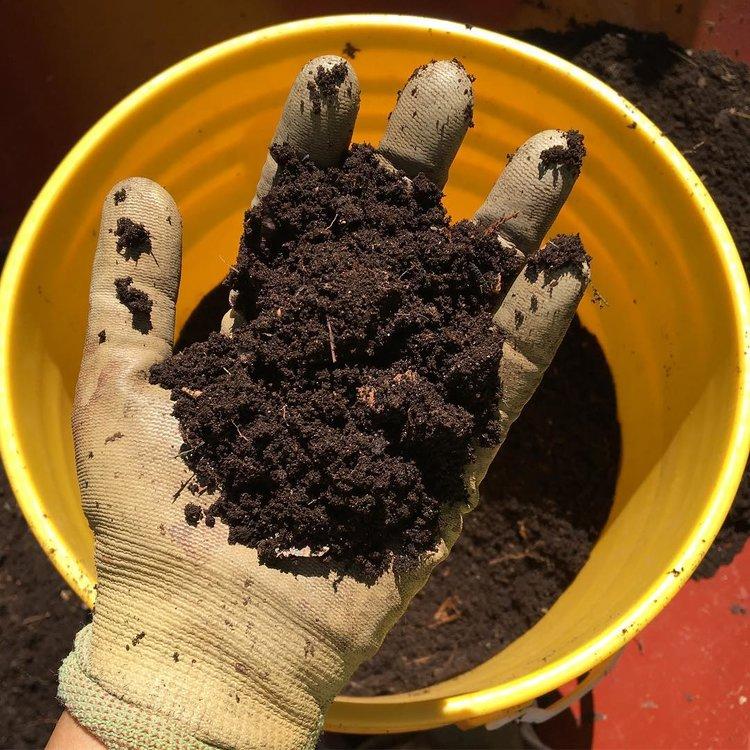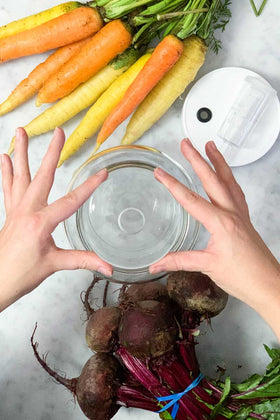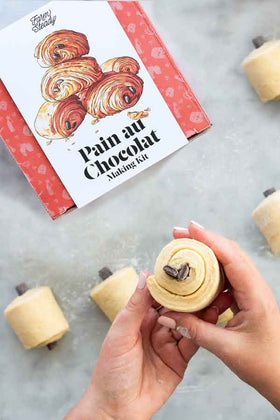Free Shipping Over $75

Q&A: Talking Worms With The Compostess
Bring on the worms, the wet leaves, the used fruit peels, and the extra coffee grounds. For Rebecca Louie, the dirtier, the better. Known as The Compostess - more at home outside with her sleeves rolled up and elbows deep in dirt - Rebecca has made a living out of writing about trash, crawlers, food scraps and leaves. A certified NYC Master Composter and author of the delightful book, Compost City: Practical Composting Know-How for Small-Space Living, this super composter has taken a topic perceived as “dirty” and “gross” and morphed it into a sweet, rich hobby that is not only fun, but also easy and sustainable.
A former features writer at The New York Daily News and arts editor at Vibe magazine, Rebecca traded in the glitz and glamour of celebrities for tubs full of worms and hives with over one hundred and fifty thousand honeybees. As she likes to call it she, “choose green living over the red carpet.” Now the queen of Ma Earth (as she lovingly refers to our patron of nature), Rebecca couldn’t be happier to be living sustainably and teaching others how to compost even in a big city like New York.
Splitting her time between New York City and the Catskills, Rebecca takes her compositing passion from a bokashi bucket under her apartment sink to a full grown garden upstate. A self-proclaimed green girl, who flings peels into the woods for fun and plants garlic, onions, potatoes, squash and tomatoes in soil enriched with her own compost, Rebecca has certainly earned her lustrous, shiny (or maybe we should dirty and grubby) title of The Compostess.
We asked The Compostess to share the origins of her composting career, “break down” the best tips for starting a petri dish of organics in the city, and give us the lowdown on why she has never, ever had a bad moment composting (seriously EVER).
Did you ever think you would be a composter? Did your family compost growing up?
Nope and nope! I thought I was going to be an advertising executive like Angela Bower on “Who’s the Boss,” lol. I grew up in Queens, and even though we had a backyard, I never did anything in it except eat BBQ on the patio. The grass was just scenery; I didn’t know how to play in it. My parents were doctors and worked six days a week, focused on supporting their family. The environment and sustainability just wasn’t on our radar.
Why compost?
I like to think of composting as a lifestyle.
The small picture: It’s so, so easy and so, so fun! There is a misconception that composting has to be this gigantic, sweaty, dirty, outdoor chore that takes a lot of time and muscle. In reality, individuals, families, friends, and communities can utilize a range of systems and strategies that fit into any space, scale, and lifestyle.
The medium picture: Composting gets folks away from their screens, connecting with nature even at the tiniest of microscopic levels, and can be a fabulous gateway drug into green living practices like gardening, cooking, and community-building.
The big picture: Um, not to be all gloom and doom here, but we’re in a bit of a pickle when it comes to Ma Earth. Over 30% of what goes to landfills in the US alone is compostable. Instead of being turned into an amazing, rich soil amendment that nourishes plant life and the general ecosystem, it’s decomposing slowly and anaerobically amid junk leaching greenhouse gases into the air and ammonias into our soils and waterways. (And p.s. the globe is currently in a topsoil crisis losing way more each year to degradation than we are building it.) Plus, there’s the negative impact of the fossil fuels used to haul and process all of that waste. Composting is a win-win solution where not only is the burden on the waste stream lightened, but a wonderful, essential product is produced instead.
What types of composting do you do?
Insert maniacal cackle here! What don’t I do? :D Current compost endeavors include, but are not limited to: worm bin, bokashi fermentation to process meat/dairy/cooked foods, container composting, outdoor pile for lasagna composting, and trenching directly in soil.
Besides composting, what else do you do in the city to help the environment?
Aside from giving compost talks and organizing an office composting program at my co-working space for writers (we divert ~10 densely packed gallons of food waste a month), I am also an advisor to The Honeybee Conservancy. This amazing org not only advocates for pollinator education, but has a fantastic Sponsor A Hive opportunity where schools, gardens, and communities can apply for free honeybee hives, bees, and gear to enhance their programs. I keep bees in the Catskills.
What is your best advice for someone who wants to get into composting?
Don’t bite off more than you can compost. In other words, start small, then scale. Often, people’s interest and ambition get ahead of the practicalities of composting. They want to compost all of the food waste, as fast as possible. However, as with anything, there is a learning curve. The secret to successful composting is getting to know how the microbes and organisms in your system work in the environment you’ve provided them, and also understanding how much time, space, and energy you have to commit to a system. When a person or community starts small, troubleshoots, and then knocks it out of the park, they can scale up in a better positioned to succeed. Oh, and also -- REMEMBER TO HAVE FUN! :D
How did you get over the stereotypical “grossness” of composting?
There are two types of “gross” that people encounter when composting. First is the general fact of organicwaste; we’re so conditioned to see food scraps as “garbage” that dealing with them anywhere outside of a trash makes some people uncomfortable. The second “ew” is the stinky muck that results from composting gone wrong, and unfortunately that happens more often than it needs to.
However, both issues are easy to solve. Shifting your mindset around waste helps a lot: what’s gross about peels and worms when we live in a world where oysters and snails are delicacies and we show love by rubbing our moist mouths together? When you think about it, most things can be perceived as gross...or not gross...just bend your mind and adapt.
From a more hands-on perspective, it’s super, duper, insanely easy to compost correctly with just a little bit of information. Think of making compost like making your favorite recipe. There are basic ingredients (dry, carbon-rich materials like autumn leaves and wet, nitrogen-rich materials like food peels) and youhave to mix them a certain way. If you don’t, or if the ingredients are imbalanced, your recipe will flop and end up gross. In my book Compost City, I dive into a broad range of solutions and techniques and provide practical tips on how to ensure they are a success.
You are located in NYC and the Catskills… Do you compost differently in the city vs. in the country?
For sure. In the city, I have a discreet worm bin in my living room, a bokashi bucket under my kitchen sink, and bury peels in a window box I use exclusively for soil-making. When upstate, I trench the bokashi bucket contents in raised beds and also have a big pile where I layer food and landscaping clippings. I’ve also been known to fling peels into the woods for fun.
What is the most difficult part about composting in a city?
Space can be a big issue, which is why indoor composting with worm bins is a great solution for individuals in close quarters. If you’re lucky enough have access to a yard or community garden, wrangling pests and skeptical neighbors can be a challenge.
Is there a minimum amount of space you need to be able to really compost?
Nope, not at all. You can compost a tea bag in a pot of soil, if that’s what works best for you. So long as you foster the right moisture, temperature, carbon, and nitrogen balances, the microbes will come and do their work!
Name your proudest or happiest moment since you’ve been composting.
I have to say, everything about composting makes me insanely happy. I never, ever have a bad moment doing it, talking about it, or writing about it -- EVER. Even if I’m elbow deep in someone’s lunch scraps -- cross my heart. It’s incredibly nurturing and healing. On the proud side, I still can’t believe I had the opportunity to write and illustrate my book, Compost City: Practical Composting Know-How for Small-Space Living. As a career writer (first a journalist, now a content director), Compost City gave me a rare opportunity to meld two passions of mine: writing and and composting, and it’s been a great way for me to connect with other eco-minded folks all around the globe!



Leave a comment